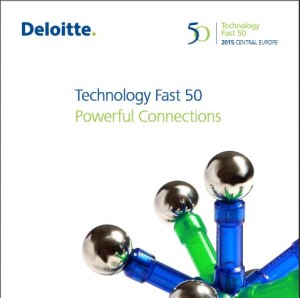Deloitte embarked on this journey 16 years ago with the intention of gaining recognition for the burgeoning technology sector that already existed throughout the countries of Central Europe. The number of applications for the Fast 50 increases every year, which indicates that companies themselves acknowledge the Fast 50 as a way of gaining regional, European and worldwide recognition. The participation rate and geographical diversity of companies in this year’s rankings are higher than ever.
The Fast 50 puts companies in the spotlight. It connects them with the market, with prospective clients and with potential investors. Participation in the ranking provides them with additional credibility, an enhanced reputation and brand eminence. Being listed in the Fast 50 draws attention to their innovative approach to business and potential for growth. According to the CEOs we surveyed in this year’s edition, fast-growing technology companies face many challenges, one of which is continuing to drive innovation. Although these companies face a wide variety of challenges, CEOs also expressed how high-quality employees have contributed to their growth and will continue to do so in the year to come. We trust you will find many interesting stories in this year’s Technology Fast 50 in Central Europe, and that you will appreciate the value of this overview of our region’s technology sector.
…
Challenges
The phrase ‘innovate or die’ is nowhere truer than in the technology sector. The CEOs of Fast 50 companies, almost invariably in fiercely competitive industries, live
with the need to innovate as a day-to-day reality as customer expectations drive the relentless search for continuous product and process improvement.
This is why innovation is the biggest challenge facing respondents, 68.4% place it among the top three challenges they face (a massive rise from last year’s 20.4%).
However, innovation is a creative process that cannot be switched on at will. It is a challenge that can only be resolved by the skills, knowledge and imagination of the workforce. This is why talent management (selected by 52.6%) is a closely related (and still highly challenging) success factor – getting this right provides the competitive edge that tech companies need to win in a fast-moving market environment.
Interestingly, the challenges posed in maintaining successful customer relationships have slipped in importance from second to sixth place since last year.
This may be due to the recognition that companies increasingly rely on factors like innovation and product quality to underpin strong customer relationships.
This could also explain the low ranking of competition among the CEOs’ challenges – they recognise that their ability to succeed and outperform their rivals lies in
their own hands.
…
Growth factors
A high 60.5% of our CEO respondents selected high-quality employees as the key driver of growth, significantly ahead of strong leadership (44.7%) which is in second place. Interestingly, these are the only two ‘human’ qualities on the list of options – most other factors relate to disciplines that are carried out by people. Factors like effective product development or improved sales & marketing activities, for example, depend on the activities of high-quality employees under the direction of strong leaders.
This highlights where perhaps the most intense area of competition is among the CE region’s technology companies – in the ongoing battle to employ and retain
the best talent. The extreme growth rates achieved by the companies towards the top of the ranking highlight the immense importance of the need to constantly
grow the workforce while maintaining the highest possible quality standards.
It is also interesting to note the relatively low position in the list of having a sound business strategy (in ninth place with 13.2%). Many of the other choices that
score more highly, such as developing existing products, diversification, targeting new segments and owning proprietary technology, would commonly be subsidiary elements of a wider business strategy. Perhaps this suggests that, for young, fast-growing companies, a narrower emphasis often provides them with the immediate, achievable focus that they need to succeed in the short term.
…
Adam Chróścielewski
Fast 50 Programme Leader
Deloitte Central Europe
More: Deloitte Technology Fast 50 in Central Europe 2015
